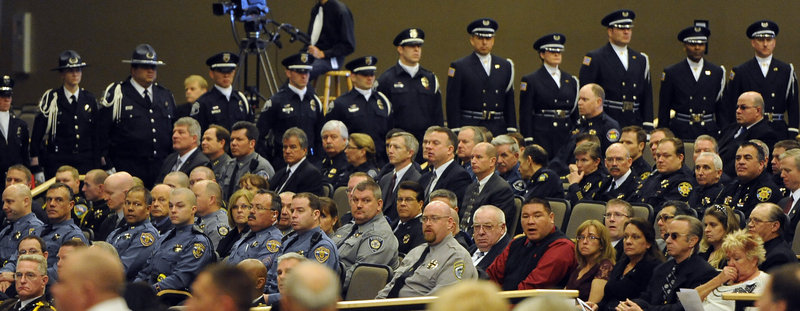COLORADO SPRINGS, Colo.
Gun evidence links parolee with corrections chief death
Gun evidence links a Colorado parolee fatally shot in Texas with the death of Colorado’s corrections’ chief, investigators said Monday.
The El Paso County sheriff’s office said that “unique and often microscopic markings” found on shell casings in Texas and Colorado led investigators to conclude that the gun Evan Ebel used to shoot at authorities in Texas was the same gun used to kill Tom Clements at his home last Tuesday.
It had been known that the casings found at both scenes were of the same caliber and brand but Monday’s announcement was the first time Colorado investigators made a direct link between Ebel and Clements’ death.
What remained unknown was why Clements was killed when he answered his front door and whether Ebel acted alone.
SEATTLE
Suspect who plotted attack sentenced to 18-year term
A man who plotted to attack a Seattle military complex with machine guns and grenades was sentenced Monday to 18 years in prison.
Abu Khalid Abdul-Latif, 35, also was ordered by U.S. District Court Judge James L. Robart to be supervised for 10 years after his release.
Abdul-Latif, also known as Joseph Anthony Davis, pleaded guilty in December to conspiracy to murder U.S. officers and conspiracy to use weapons of mass destruction.
The judge said he found evidence that Abdul-Latif conducted surveillance of the Military Entrance Processing Station in south Seattle, ordered and purchased weapons and that the location of the target was the defendant’s idea.
In the courtroom, Abdul-Latif’s wife, Binta Moussa-Davis, could be heard praying as she watched the proceedings from the second row. “The informant, he’s not reliable,” she repeated several times.
NEW YORK
Class-action lawsuit accuses Met of defrauding public
Before visitors to the Metropolitan Museum of Art can stroll past the Picassos, Renoirs, Rembrandts and other priceless works, they must first deal with the ticket line, the posted $25 adult admission and the meaning of the word in smaller type just beneath it: “recommended.”
Many people, especially foreign tourists, don’t see it, don’t understand it or don’t question it. If they ask, they are told the fee is merely a suggested donation: You can pay what you wish, but you must pay something.
Confusion over what’s required to enter one of the world’s great museums, which draws more than 6 million visitors a year, is at the heart of a class-action lawsuit this month accusing the Met of scheming to defraud the public into believing the fees are required.
The suit seeks compensation for museum members and visitors who paid by credit card over the past few years, although some who choose to pay less than the full price pull out a $10 or $5 bill. Some fork over a buck or loose change. Those who balk at paying anything at all are told they won’t be allowed in unless they pay something, even a penny.
DETROIT
Ex-tennis pro is sentenced on forced labor charges
A former tennis pro from Africa was sentenced Monday to more than 11 years in federal prison after a jury convicted him in October on four counts of forced labor.
Jean-Claude Toviave faked immigration papers and brought children to Michigan, where he forced them to cook and clean while starving and beating them with toilet plungers, broomsticks and electrical cords. Some of them were only in middle school.
Toviave presented the children as his own, but authorities and the victims’ statements described them as little more than slaves with little chance to escape in a foreign country.
“I prayed at night that God would either help me to be free or allow your assaults to kill me,” one boy, now in high school, wrote in a victim impact statement. “The pain is something I will never forget. In the midst of your verbal and physical assaults, you worked the four of us to death.”
Toviave, 44, previously pleaded guilty to fraud and misuse of visas, mail fraud and harboring aliens.
PASSAIC, N.J.
Powerball jackpot winner says he wants to help family
The winner of a $338 million Powerball jackpot told media outlets Monday that his first priority will be helping his family.
Pedro Quezada, 44, entered Eagle Liquors store, where the ticket was sold, late Monday afternoon. The Passaic store owner ran Quezada’s ticket through the lottery machine to validate that it was a winner as a newspaper and television outlets recorded the moment.
Quezada, an immigrant from the Dominican Republic, told reporters in Spanish that he was “very happy” and that he intends to help his family.
His wife, Ines Sanchez, told the Bergen Record that Quezada called her with the news Monday afternoon.
“I still can’t believe it,” she said. “We never expected it but thank God.”
The numbers drawn Saturday were 17, 29, 31, 52, 53 and Powerball 31. A lump sum payout would be $221 million, or about $152 million after taxes. It’s the fourth-largest jackpot in Powerball history.
The family’s apartment sits at the end of a short dead end block that abuts a highway in Passaic, 15 miles northwest of New York City. Neighbors stood out in the rain Monday night and spoke with pride that one of their own had struck it rich.
— From news service reports
Send questions/comments to the editors.



Success. Please wait for the page to reload. If the page does not reload within 5 seconds, please refresh the page.
Enter your email and password to access comments.
Hi, to comment on stories you must . This profile is in addition to your subscription and website login.
Already have a commenting profile? .
Invalid username/password.
Please check your email to confirm and complete your registration.
Only subscribers are eligible to post comments. Please subscribe or login first for digital access. Here’s why.
Use the form below to reset your password. When you've submitted your account email, we will send an email with a reset code.